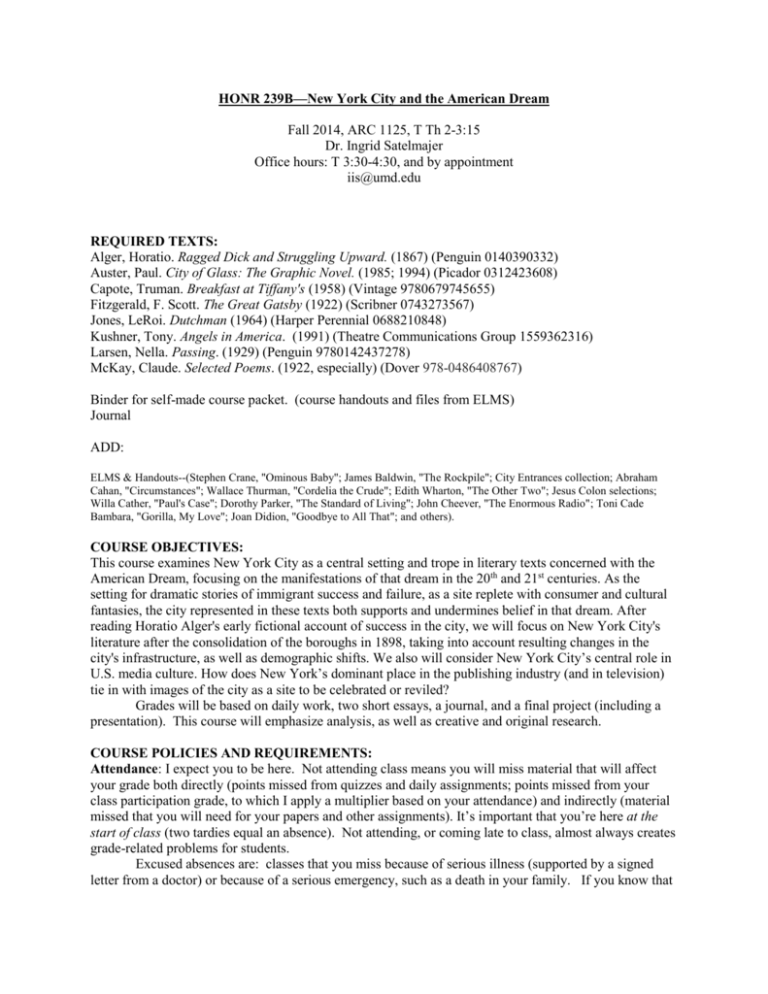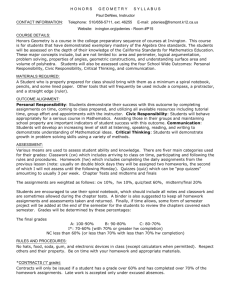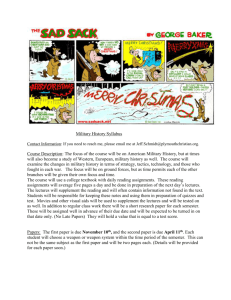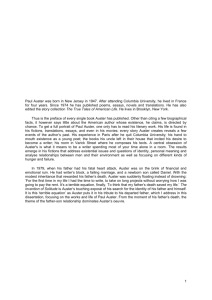HONR239B Syllabus - University Honors
advertisement

HONR 239B—New York City and the American Dream Fall 2014, ARC 1125, T Th 2-3:15 Dr. Ingrid Satelmajer Office hours: T 3:30-4:30, and by appointment iis@umd.edu REQUIRED TEXTS: Alger, Horatio. Ragged Dick and Struggling Upward. (1867) (Penguin 0140390332) Auster, Paul. City of Glass: The Graphic Novel. (1985; 1994) (Picador 0312423608) Capote, Truman. Breakfast at Tiffany's (1958) (Vintage 9780679745655) Fitzgerald, F. Scott. The Great Gatsby (1922) (Scribner 0743273567) Jones, LeRoi. Dutchman (1964) (Harper Perennial 0688210848) Kushner, Tony. Angels in America. (1991) (Theatre Communications Group 1559362316) Larsen, Nella. Passing. (1929) (Penguin 9780142437278) McKay, Claude. Selected Poems. (1922, especially) (Dover 978-0486408767) Binder for self-made course packet. (course handouts and files from ELMS) Journal ADD: ELMS & Handouts--(Stephen Crane, "Ominous Baby"; James Baldwin, "The Rockpile"; City Entrances collection; Abraham Cahan, "Circumstances"; Wallace Thurman, "Cordelia the Crude"; Edith Wharton, "The Other Two"; Jesus Colon selections; Willa Cather, "Paul's Case"; Dorothy Parker, "The Standard of Living"; John Cheever, "The Enormous Radio"; Toni Cade Bambara, "Gorilla, My Love"; Joan Didion, "Goodbye to All That"; and others). COURSE OBJECTIVES: This course examines New York City as a central setting and trope in literary texts concerned with the American Dream, focusing on the manifestations of that dream in the 20th and 21st centuries. As the setting for dramatic stories of immigrant success and failure, as a site replete with consumer and cultural fantasies, the city represented in these texts both supports and undermines belief in that dream. After reading Horatio Alger's early fictional account of success in the city, we will focus on New York City's literature after the consolidation of the boroughs in 1898, taking into account resulting changes in the city's infrastructure, as well as demographic shifts. We also will consider New York City’s central role in U.S. media culture. How does New York’s dominant place in the publishing industry (and in television) tie in with images of the city as a site to be celebrated or reviled? Grades will be based on daily work, two short essays, a journal, and a final project (including a presentation). This course will emphasize analysis, as well as creative and original research. COURSE POLICIES AND REQUIREMENTS: Attendance: I expect you to be here. Not attending class means you will miss material that will affect your grade both directly (points missed from quizzes and daily assignments; points missed from your class participation grade, to which I apply a multiplier based on your attendance) and indirectly (material missed that you will need for your papers and other assignments). It’s important that you’re here at the start of class (two tardies equal an absence). Not attending, or coming late to class, almost always creates grade-related problems for students. Excused absences are: classes that you miss because of serious illness (supported by a signed letter from a doctor) or because of a serious emergency, such as a death in your family. If you know that you will be missing class, you must notify me ahead of time. The day that you return to class, you must bring a note identifying the date of and reason for the absence, and acknowledging that the information in the note is accurate. It also is your responsibility to find out on the day you return if there is any possibility to make up missed work. If you are absent more than one time, I require documentation signed by a health care professional. If you are absent on days when there are formally scheduled assignments (tests and papers), you are required to notify me in advance and, upon returning to class, bring documentation of the illness, signed by a health care professional. Note: If you will be missing any classes/deadlines on the basis of religious observance, you must let me know in writing during the first two weeks of the semester. Requirements: Note: Assignments are due at the start of class and must be typewritten and handed in as hardcopy. Do not send assignments via email. And here's the advice I was given as an undergraduate (though not with any guarantees): Best shot at A-level work comes from three hours of study per course credit hour (i.e., 9 hours per week for a three-credit class). Reading We will do a lot of reading for this class. Assignments are listed next to the date that they are due and should be done before class begins. Make sure that you schedule adequate time to process your reading. Quizzes, short exams, homework; Participation (12.5% and 12.5%; 25% total) Expect unannounced reading quizzes, which will be given at the beginning of class. You cannot make up missed quizzes, but I will drop your lowest quiz grade. There also may be typed informal responses, small cultural context assignments, as well as typed notes assignments. I expect you to come to class having completed the day’s assignment and ready to engage in thoughtful discussion in response to the material (bring relevant material in hardcopy; demonstrate careful note-taking; turn off all electronic devices). Failing to observe these guidelines will result in a zero for class participation that day. In addition to atlarge class discussions and in-class group work, you will be called on individually to help with class discussion. Please see attendance expectations as stated above. Short formal papers (15% and 15%; 30% total) In addition to your final project report, you will write a formal analytical essay and a report on a "City Space." A handout with detailed instructions will be given out for both short assignments. (~3 pgs. each) Journal (10%) You'll keep a journal throughout the semester of cultural clippings and responses to course readings; the journal also will include a log of responses and work done in connection to your final project text. Formal Final Project (presentation and final paper) (15; 20; 35% total) After choosing a text in consultation with me, you will pursue throughout the semester one major project. That project will have three graded components: the relevant portion of your reading journal (see above), a project presentation, and a final project report (option A: ~5-7 pgs.; option B: ~7-10 pgs.). Detailed handouts will explain further the separate components, but a successful final project will in part reflect a thorough understanding and critical consideration of course material covered throughout the whole of the semester. Course requirements will determine your grade as follows: Quizzes and homework; class participation (12.5% and 12.5%; 25% total) Formal Analytical Paper (15%) City Spaces Report/Analysis (15%) Journal (10%) Presentation (15%) Final Project Paper (20%) Final letter grades will be determined by the following percentages: A/B+/C+/D+ 97-100/87-89/77-79/67-69 A/B/C/D 93-96/83-86/73-76/63-66 A-/B-/C-/D90-92/80-82/70-72/60-62 F 59 and lower Academic Integrity: Plagiarism, whether it is submitting someone else’s work as your own, submitting your own work completed for another class without my permission, or otherwise violating the University’s Code of Academic Integrity, will not be tolerated and will result in a grade of XF. If you have questions about how to use and attribute use of sources, talk to me and see the “students” link on the Student Honor Council website. The Honors Code prohibits students from cheating on exams, plagiarizing papers, submitting the same paper for credit in two courses without authorization, buying papers, submitting fraudulent documents, and forging signatures. The University’s Code is on line at www.studenthonorcouncil.umd.edu/code.html. You will be asked to write and sign The Honor Pledge, a statement of integrity, on each formal paper you turn in to this class: “I pledge on my honor that I have not given or received any unauthorized (or unacknowledged) assistance on this assignment. Moreover, I have not taken or ‘borrowed’ the ideas or words of another without properly citing that source.” The Honors College works to enrich its community life by promoting an atmosphere of honesty, trust, and mutual responsibility. In the event that an Honors College student is found responsible for a violation of the Code of Academic Integrity by the Student Honor Council, he or she will be dismissed from the Honors College for the semester in which the violation took place and for all subsequent semesters in which the student is enrolled as an undergraduate at Maryland. What to do about additional questions or problems: If you have questions about procedures, if a problem occurs, or if you want to request flexibility in connection with a course requirement, write me a memo, making clear what you are asking for and telling me whatever I need to know to make a decision. I can make better decisions if I am given good information and time to consider a question or problem. Please keep in mind that submitting a memo will not necessarily result in the fulfillment of your request. Inclement weather/other closings: The university announces closings via the UM website, Terp Radio (1640 AM), and local media venues (e.g., 103.5 FM). In case of university closing, continue with scheduled readings and assignments per the syllabus, and check your university email account for additional instructions. Special Circumstances: If you have a registered disability that requires accommodation (see www.counseling.umd.edu/DSS/receivingserv.html), please see me immediately. If you have a disability and have not yet registered with Disability Support Services in the Shoemaker Building (4-7682 or 57683 TDD), you should do so promptly. NOTE: This syllabus might change. Advance notice will be given of changes that affect grading, assignments, etc. Syllabus (H)--Handout (E)--ELMS T 9/02 Introduction I. Labor, Companionship, and Identity Formation in the City "You start building your private New York the first time you lay eyes on it. Maybe you were in a cab leaving the airport when the skyline first roused itself into view . . . . Maybe your parents dragged you here for a vacation when you were a kid and towed you up and down the gigantic avenues to shop for Christmas gifts . . . . . Maybe you came to visit your old buddy, the one who moved here last summer, and there was some mix-up as to where you were supposed to meet. You stepped out of Penn Station into the dizzying hustle of Eighth Avenue and fainted. Freeze it there: that instant is the first brick in your city." (Colson Whitehead, The Colossus of New York) Th 9/04 Horatio Alger, Ragged Dick (3-85; through Ch. XVII) T 9/09 Alger, cont. (86-132; Ch. XVIII-end) Stephen Crane, "Ominous Baby" (H), James McCune Smith, "The Boot-Black" (H), Samuel R. Delany, excerpt from "Times Square Blue" (H), and others Due: Mapping labor, identity, and the American Dream Th 9/11 City Entrances: Emma Lazarus, "The New Colossus"; Fanny Trollope, selection; Alexis de Tocqueville, selection; Walt Whitman, selection; Abraham Cahan, "I Discover America" from The Rise of David Levinsky; Jamaica Kincaid, "Poor Visitor"; Rutu Modan, "My First Time in New York City" (H, all) M (9/16) Last day for drop/add; last day to drop without "W" T 9/16 Abraham Cahan, "Circumstances" (E); Edith Wharton, "The Other Two" (E); Wallace Thurman, "Cordelia the Crude" (H); James Baldwin, "The Rockpile" (H) Th 9/18 Jesus Colon, A Puerto Rican in New York (“A Voice” [1]; “Easy Job, Good Wages” [6]; “Two Men With But One Pair of Pants” [7]; “I Heard a Man Crying” [9]; “Kipling and I” [10]; “How to Rent an Apartment” [11]; “Grandma, Please Don’t Come!” [50]) (E, all) T 9/23 Due: Formal Analytical Paper II. Artists and Idealists: The Transient City "They send me to eat in the kitchen When company comes, But I laugh, And eat well, And grow strong." (from Langston Hughes, "I, Too, Sing America") Th 9/25 Willa Cather, "Paul's Case"; E. B. White, "The Second Tree from the Corner" (E, both); Claude McKay, selections T 9/30 Claude McKay, Selections; Dorothy Parker, "The Standard of Living" and John Cheever, "The Enormous Radio" (E, all); "Jenny from the Block" Due: Project text choices Also, paper #2 choice Th 10/02 F. Scott Fitzgerald, The Great Gatsby, 1-96 T 10/07 Fitzgerald, 97-180; Anzia Yezierska, "This Is What $10,000 Did to Me" (E) Th 10/09 Nella Larsen, Passing (Part one ["Encounter," 9-47]) Journal, 1 of 3 T 10/14 Larsen, Passing (Parts two and three ["Re-encounter" and "Finale," 51-114]) Th 10/16 Truman Capote, Breakfast at Tiffany's, 3-74 [up to "Trawler marries fourth." T 10/21 Capote, Breakfast, cont., 74 ["Trawler marries fourth."]-111 Th 10/23 Due: Formal paper #2--City Spaces assignment on green spaces III. Then Came the Suburbs "One of the eerie and provocative aspects of the concert was the invisibility of two dancers . . . who were stationed on rooftops several blocks below Canal Street. Though they could not be seen by the audience, the entire chain picked up signals from them and one could see 'their' movements approaching uptown in a broad ripple of imitative movement as the chain passed on the particulars of the variation to the other terminus . . . a half-mile away at 420 West Broadway. It was like receiving messages from outer space." (3 July 1973 New York Times article describing choreographer Trisha Brown's "Roof Piece") T 10/28 Erin Belieu, "When at a Certain Party in NYC" (http://www.motionpoems.com/?p=783) LeRoi Jones, Dutchman Th 10/30 Paul Auster, City of Glass: The Graphic Novel (1-45) T 11/04 Auster, City of Glass: The Graphic Novel (46-end) Th 11/06 Toni Cade Bambara, "Gorilla, My Love"; Joan Didion, "Goodbye to All That" (E, all) T 11/11 Tony Kushner, Angels in America (15-89; Millennium, through Act Two) T (11/11)—Last day to drop with "W" Th 11/13 Kushner, cont. (91-182; through Act Two, Perestroika) T 11/18 Kushner, cont. (eliminate in Act Five: portions of Scene 5; all of Scenes 6 and 9 [see Kushner's note on pp. 142-143]) (Read Perestroika, Act Three [p. 183] to End) Journal, 2 of 3 Th 11/20 Individual conferences Due: Journal notes T 11/25 Individual conferences Due: Final journal notes Th 11/27-11/30 Thanksgiving break T 12/02 Final presentations On-line course evaluations at www.courseevalum.umd.edu. Please submit near the end of the semester. Th 12/04 Final presentations T 12/09 Final presentations Th 12/11 Final presentations Last Day of class Th 12/18 FINAL EXAM PERIOD--Final paper. Attendance required. 10:30 a.m.-12:30 p.m.









